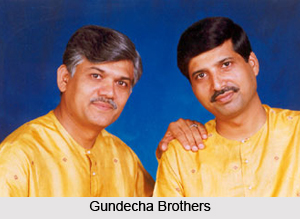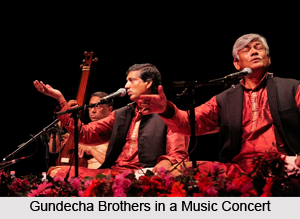 Umakant and Ramakant Gundecha have been reckoned as India`s leading advocator of the Dhrupad style of music. As one amongst the active young performers from India, they have also carved a niche for themselves in the international arena. The Gundecha brothers were born in Ujjain, an Indian place situated in the central location of India into a Jain family. They both were inducted to the traditional classical music by their parents. They are three brothers. Their third brother is a pakhawaj drummer, namely Akhilesh.
Umakant and Ramakant Gundecha have been reckoned as India`s leading advocator of the Dhrupad style of music. As one amongst the active young performers from India, they have also carved a niche for themselves in the international arena. The Gundecha brothers were born in Ujjain, an Indian place situated in the central location of India into a Jain family. They both were inducted to the traditional classical music by their parents. They are three brothers. Their third brother is a pakhawaj drummer, namely Akhilesh.
Early Life of Gundecha Brothers
The Gundecha Brothers have studied at the local Madhav Music College. Umakant obtained his post graduation in economics and Ramakant in commerce. They have been trained under the expert tutelage of Zia Fariduddin Dagar and Zia Mohiuddin Dagar. They have been regarded as the dhrupad master. Their gurus admits their lineage to the `two major forces in the second half of the 20th Century, two duos known as the senior Dagar Brothers (Nasir Moinuddin & Nasir Aminuddin) and the junior Dagar Brothers (Nasir Zahiruddin & Nasir Faiyazuddin)`. Today the Gundecha Brothers has been acknowledged as the third force.
Career of Gundecha Brothers
The Gundecha Brothers came to perform on stage for the first time in the year 1985 after their training for four years. Their first performing occasion was at the `Uttaradhikar` dance and music festival held in Bhopal. The Gundecha Brothers have developed a unique style of their own. They with `strong lower registers` sings in a comparatively `less aggressive style` that is to a degree distinguishing from other Dagar singers. It seems that they have imbibed this unique style from their guru Zia Mohiuddin, Rudra veena player, who was a genius in playing slow music. The Gundecha Brothers has always attempted to enrich the dhrupadi range of skills by integrating the ancient texts of Hindi poets such as Tulsidas, Padmakar and Nirala.
 The Gundecha Brothers has recorded many cassettes and CDs with H.M.V, Music Today, Rhythm House, IPPNW Concerts Berlin, Navras and Audio Rec London. They have also executed at many TV channels that have been aired on British, U.S., German and French Radio as well. They have also bagged the honour of being performed at many highly esteemed festivals at India or in the international stage. They have performed in the countries like Europe, U.S.A, Australia, Singapore, Bangladesh, U.A.E and Hong Kong. They were invited to perform at many concerts.
The Gundecha Brothers has recorded many cassettes and CDs with H.M.V, Music Today, Rhythm House, IPPNW Concerts Berlin, Navras and Audio Rec London. They have also executed at many TV channels that have been aired on British, U.S., German and French Radio as well. They have also bagged the honour of being performed at many highly esteemed festivals at India or in the international stage. They have performed in the countries like Europe, U.S.A, Australia, Singapore, Bangladesh, U.A.E and Hong Kong. They were invited to perform at many concerts.
Some noteworthy concert where they have executed in India are: Sawai Gandharva Festival at Pune; Harvallabh Sangeet Sabha at Jalandhar district; Tansen Sangeet Samaroh at Gwalior; IMG Music Festival- Saint Xavier`s at Mumbai; Pt.Bhimsen Joshi Birthday Festival, NCPA Mumbai; Banganga Festival at Mumbai; Soorya Festival at Trivandrum; Swati Tirunal Festival at Trivandrum; National Purandar Festival at Udupi district; Saptak at Ahamdabad; Ganga Mahotsawa at Varanasi; Shankarlal Music Festival at Delhi; Dover lane Music Festival at Kolkata; SRA Music Festival at Kolkata; Swami Vivekanand Birthday Music Festival-GolPark at Kolkta; Shrikrishna Gana Sabha at Chennai; Madras Music Academy Festival Chennai; Hridayanath Mangeshkar Music Festival at Goa; Spic Macay Delhi; Vasanta Habba, Bengaluru; Rana Kumbha Music Festival, Udaipur; Bhakti Utsav, New Delhi and Swarnotsava at Guwahati.
Some important concerts by them in the international arena are: Festival of India in Germany in the year 1992; Indo Norwegian Society Festival in the year 1992; Asian Art Festival, Hongkong in the year1992; India International Music Festival, Bombay in the year 1993; Spic-Macay National Convention,Norfolk USA in the year 1994; Detroit Institute of Art, USA in the year 1994; Western Music Conservatory, Winterthur, Switzerland in the year 1994; Smithsonian Institution, Washington D.C., USA in the year 1995; The Walter Art Gallery, Baltimore, USA in the year 1995; House of World Culture, Berlin, Germany in the year 1996; Theater De La Ville, Paris, France in the year 1996; Navaras, London, U.K. in the year 1996; Smithsonian Institution, Washington D.C. in the year 1998; Flanderen Festival, Belgium in the year 1998; Gandhar, Abu Dhabi, UAE in the year 1998; Ali Akbar College of Music, Basel, Switzerland in the year 1998; USA Tour in the year 1999; Bangladesh Tour in the year 2000; Art Festival- Singapore in the year 2000; Sacred Voices Millennium Music Village-UK in the year 2000; Cite de la music, Paris France in the year 2003; Palais des Beaux-Arts, Brussels Belgium in the year 2003; Tokyo summer festival, Japan in the year 2003; Workshop in University of Bologna, Italy in the year 2003; Rencontres Internationales de musique m‚di‚vale du thoronet, France in the year 2003; USA concert tour in the year 2004; Republic Day Celebration in Seychelles in the year 2004; Australian Concert tour in the year 2005; USA concert tour in the year 2006; World Book Fair - Frankfurt - October in the year 2006; Festival of India in Belgium in the year 2007; Bode Museum , Berlin - Germany in the year 2007; Sommer Szene, Salzburg - Austria in the year 2007; Julidans Festival, Amsterdam - Holland in the year 2007.
Awards of Gundecha Brothers
The M.P Government has conferred scholarship to this brother duo, which was activated from the year 1981 to 1985. They have also received National fellowship from the year 1987 to 1989, Ustad Allauddin Khan Fellowship in 1993, Sanskriti Award in 1994 and Kumar Gandharva Award in 1998 by Govt. of Madhya Pradesh and Dagar Gharana Award by Mewar Foundation in 2001.




















